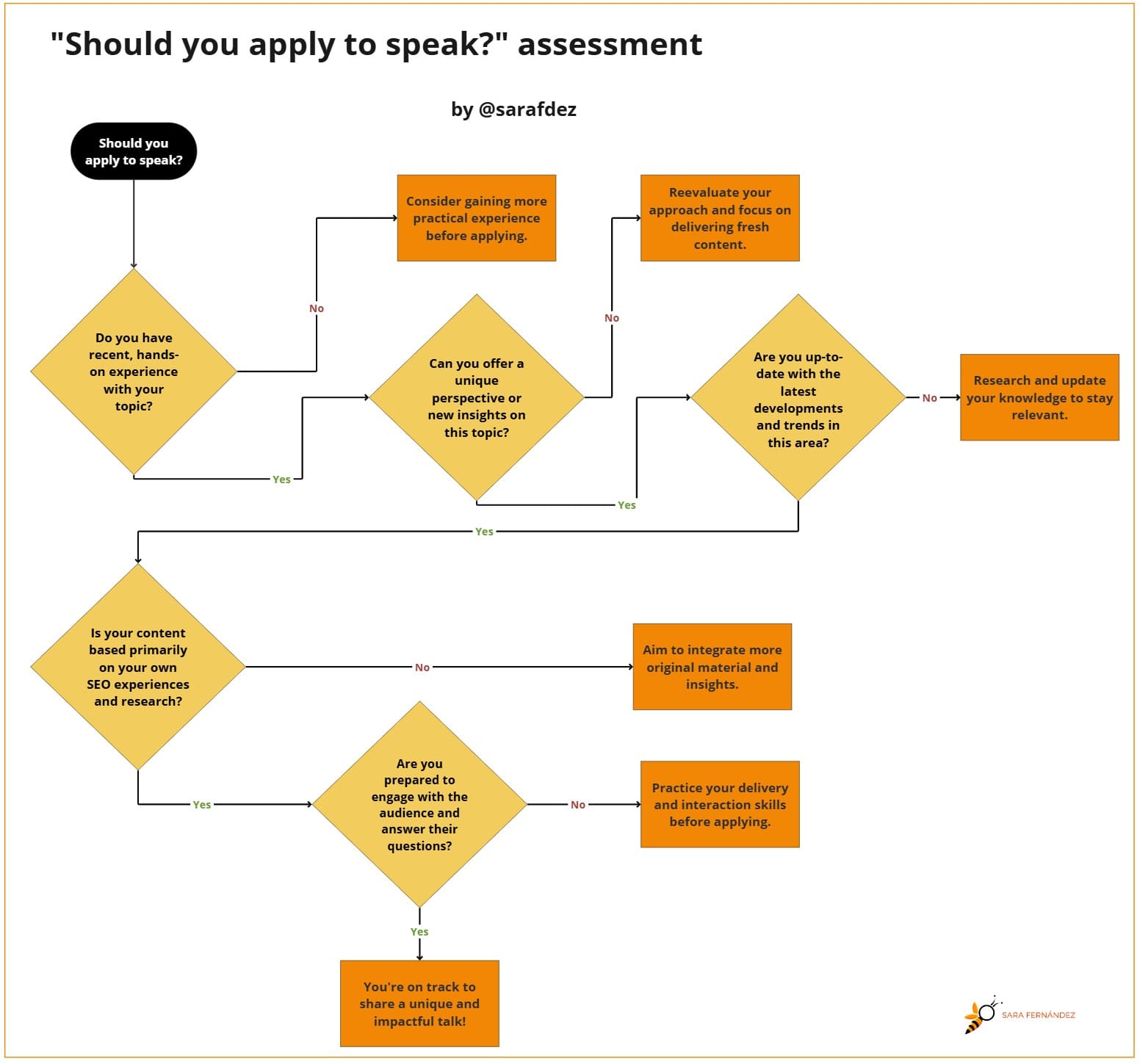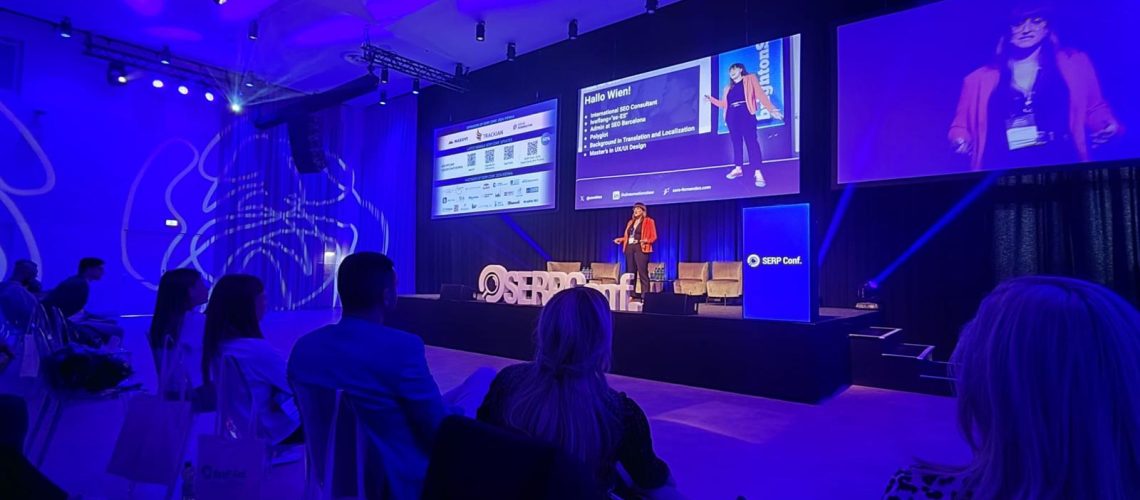As a speaker and regular attendee at international SEO events, I’ve noticed that in our industry, quantity of speakers is increasingly prioritized over quality. This has led to a rise in talks that lack originality and depth. As a result, many attendees prefer to focus on networking and choose to attend fewer presentations, missing out on an essential part of the experience these events should provide.
In this article, we will reflect on the challenges posed by repetitive content in SEO conferences, the importance of selecting speakers thoughtfully, and how originality and experience can elevate the quality of these events. Whether you organize conferences, are considering giving your first talk, or already have experience as a speaker, here you’ll find practical advice to help us, together, bring greater value to SEO talks.
When talks become repetitive
Throughout my experience at SEO conferences, I’ve noticed a recurring issue: many speakers tend to repeat what others have already said, without offering their own perspectives or experiences. This repetition is not only frustrating but also detracts from the value of these events. Attendees come seeking fresh ideas, practical advice, or innovative approaches to enhance their own strategies. However, when faced with recycled or generic content across multiple sessions, they often lose interest and may even begin to question the overall quality of the event.
This phenomenon is even more pronounced in online formats, such as webinars and podcasts, where the ease of organization and low costs have led to a saturation of content. Nevertheless, the same issue occurs in high-profile in-person conferences, where lineups featuring dozens of speakers tend to prioritize quantity over quality.
The situation becomes even more challenging with talks and panels focused on general or trendy topics, such as "the future of SEO", "AI trends" or "quick wins for SEO". While these topics are undoubtedly relevant, many of these presentations tend to cover superficial concepts or recycled ideas that can easily be found online. This not only frustrates those who have invested time and money to attend but also limits the opportunity to deliver truly innovative and practical content—content that attendees could apply to their own projects.
The importance of carefully vetting speakers
The number of SEO speakers has increased significantly, often driven by the desire to gain visibility or achieve a certain level of "fame" within the industry. This trend frequently prioritizes the promotion of personal branding over delivering valuable content. For this reason, it is essential for organizers to carefully select speakers, ensuring they have demonstrable experience and can truly provide useful, meaningful insights. Events should spotlight voices that bring original perspectives grounded in their own expertise, rather than focusing on giving space to well-known names or overly repetitive topics.
Speakers, in turn, also have the responsibility to go further: they must be able to delve deeper into each topic, provide practical advice, and share ideas that truly benefit the audience. As a community, we must prioritize originality and quality content, preparing talks that inspire and enrich attendees while raising the standard of events in our industry.
That said, this article is not about discouraging anyone from applying to speak. On the contrary, I believe more voices are needed in the SEO community, particularly from those who feel underrepresented or hesitate due to impostor syndrome. If you’ve ever doubted your qualifications or felt unworthy of a stage, you might find my article on overcoming impostor syndrome in SEO helpful. The goal is to ensure that all voices—whether seasoned or new—bring meaningful contributions to the table.
One of the most memorable events I’ve been part of was SERP Conf. in Vienna, where I had the chance to speak and participate in a panel and enjoyed the sessions as an attendee. What truly stood out was how carefully the organizers vetted their speakers. Every session felt intentional, with SEOs who brought fresh ideas and had the expertise to back them up. This level of curation made the event engaging and genuinely valuable for everyone involved.
Unlike larger conferences, where the goal often seems to be cramming the schedule with as many sessions as possible, SERP Conf. took a more thoughtful approach: fewer speakers but much higher-quality content. Even the panels were a highlight. Let’s be honest, panels, roundtables and podcasts, at some events can feel like overhearing strangers chatting in a bar about random topics—but not here. The discussions were sharp, focused, and genuinely insightful. SERP Conf. was a clear example of the principle that sometimes less is more.
This kind of thoughtful curation contrasts with larger events, where the focus on filling the agenda sometimes overshadows the quality of the content. Speakers are often chosen because they’re visible or skilled at pitching themselves, not necessarily because they bring new or impactful ideas.
Vetting shouldn’t discourage first-time speakers. In fact, some of the most creative and engaging talks I’ve seen have come from people presenting for the first time. However, having a structured selection process—such as asking for detailed talk outlines or proposals, video samples of past talks, or even referrals from respected SEO speakers—ensures that every speaker, regardless of experience level, adds real value. This approach not only elevates the quality of events but also gives speakers the confidence to know their voice has earned its place on the stage.
Originality as a benchmark for impactful presentations
For me, originality is essential when crafting a presentation. To test whether a topic I’m considering is truly engaging, I use a simple yet effective question: “If someone outside of SEO listened to this, would they find it interesting or at least understand something valuable from it?” This approach helps ensure that presentations remain fresh and easy to digest. It also allows me to strike a balance—ensuring that even the most advanced topics are approachable enough to provide value to someone who’s just starting out while still engaging experienced professionals.
Prioritizing originality and expertise over quantity benefits everyone. Event attendees gain practical, actionable insights and leave feeling inspired with a renewed perspective on the industry. At the same time, offering higher-quality presentations enhances the reputation of the events, positioning them as benchmarks in the field.
Balancing personal branding and industry contribution
Having visibility in SEO is key. However, it's equally important to reflect on our motivations when proposing a talk. If the main reason for speaking in public is to gain recognition, we might not be aligned with the responsibility of delivering real value to the audience attending to hear us. Talks should focus on contributing to the improvement of our industry by sharing knowledge, solving problems, and proposing ideas, rather than being driven by self-promotion or ego.
This isn’t to say that working on a personal brand is inherently negative; it naturally happens when speakers deliver meaningful and impactful talks. However, when visibility becomes the main goal, the quality of presentations often suffers. When the needs of the audience and the value they’ll gain are prioritized, speakers can achieve both: contributing to the industry and building their reputation authentically.
Growing through talks and embracing audience questions
One of the reasons I love giving talks is the opportunity to deeply explore a subject. For instance, I was recently curious about language selectors—a topic I had worked on in past projects but didn’t feel I had fully mastered. That curiosity, combined with my prior knowledge, motivated me to research further so I could dedicate a small section to it in my book on SXO. In the end, that research became the foundation for a presentation I delivered at the International Search Summit ("Mastering language selectors: Best SEO and UX practices for multilingual sites"). Preparing the talk allowed me to refine my knowledge and approach the topic from new perspectives. It was a rewarding process that enabled me to grow and share insights with others.
Additionally, it’s important to approach any topic with humility and be prepared to answer questions. Preparing a talk isn’t just about structuring slides or rehearsing its delivery—it also requires the confidence to handle the unexpected. Sometimes, audience questions highlight perspectives I hadn’t considered or areas where I need to dive deeper. In fact, these moments of interaction often provide me with some of my most valuable learning experiences.
And, as someone who also teaches SEO at university, I’ve discovered that truly mastering a subject comes from having to explain and break it down for others. This process forces me to think critically and ensures that I genuinely understand what I’m sharing. Questions, whether from students or attendees at my talks, challenge me to step outside my own perspective and consider alternative viewpoints or scenarios. These interactions not only enrich the audience but also provide me with tremendous value as a speaker.
Recognizing true expertise in a sea of voices
It’s easy to assume that an SEO professional must be a good speaker if they are highly active on platforms like LinkedIn, frequently participate in Slack communities, or regularly attend industry events. Their visibility can create the impression that they are an authority simply because they are everywhere. However, visibility doesn’t always equate to expertise. Social media activity, while helpful for showcasing knowledge and engaging in discussions, is no substitute for the experience and originality required to deliver a truly valuable presentation.
These nuances are especially important for event organizers to consider when selecting speakers. Choosing speakers based solely on their online presence can result in repetitive or shallow talks that fail to provide attendees with the fresh ideas they expect from an event. Being active online or attending numerous events may reflect enthusiasm for the field, but it doesn’t guarantee the practical experience or innovative thinking needed to deliver a satisfying session.
Organizers should prioritize professional expertise over visibility, selecting speakers who can back up their claims with actionable insights, data, and case studies drawn from their own SEO experience. Likewise, speakers should strive to go beyond online trends and focus on delivering presentations deeply rooted in their specialties, findings, and knowledge. This approach not only ensures higher-quality content but also fosters a culture of originality and genuine thought leadership within the industry.
For aspiring SEO speakers, this landscape presents both challenges and opportunities. Offering unique perspectives and fresh ideas helps your content stand out amid the noise. Focusing on quality and diving deeper into topics—beyond surface-level information everyone already knows—enables you to contribute meaningfully to industry conversations and raise the standard of SEO talks.
Tool: "Should you apply to speak?" assessment
To help aspiring speakers evaluate their readiness, I’ve created a flowchart titled "Should You Apply to Speak?" assessment. This tool is designed to guide potential speakers through key questions that determine whether they’re ready to present and ensure their topic aligns with audience expectations. The flowchart not only will help you evaluate readiness but also offers suggestions for refining your topic or preparing further if needed. Thoughtfully considering these questions allows aspiring speakers to feel more confident in their ability to deliver valuable talks that enhance the quality and credibility of SEO events:

Final thoughts
As speakers, we have the opportunity not only to inspire, educate, and connect with our audience but also to shape the events we participate in and, ultimately, the direction of our industry. Conferences serve as a powerful platform for sharing knowledge, exchanging ideas, and collectively improving the way we approach SEO. Meaningful and original talks help foster a culture of innovation and raise the standards within our field. At the same time, organizers play a key role in shaping the quality and credibility of these events. Selecting lineups that emphasize expertise, diversity and real value ensures that conferences remain impactful and engaging. Together, speakers and organizers can turn SEO events into essential spaces for learning, collaboration and collective progress.

